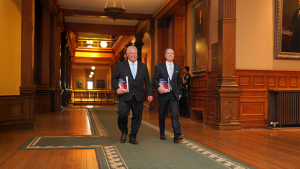The Canada BIM Council (CanBIM) has inked a memorandum of understanding with the Alberta Centre of Excellence for Building Information Modeling to actively pursue new ways to collaborate and support initiatives that advocate the use of BIM across Canada.
TORONTO
The Canada BIM Council (CanBIM) has inked a memorandum of understanding with the Alberta Centre of Excellence for Building Information Modeling to actively pursue new ways to collaborate and support initiatives that advocate the use of BIM across Canada.
CanBIM represents, supports and advocates on behalf of the architecture, engineering, construction, owner and operator (AECOO) and educational communities to build a positive business environment for the effective deployment of BIM, not only for its member firms, but for all engaged in utilizing BIM in Canada.
The Alberta centre is a not-for-profit organization dedicated to inspiring, enabling and supporting a more productive and competitive Alberta design, manufacturing and construction industry through BIM-enabled technologies.
Through this new collaboration, both organizations will act as a communications conduit whereby information is shared, “thus facilitating industry outreach to build awareness of each organization to its members and partner organizations,” CanBIM said in a release.
“We will look to maximize educational opportunities such as workshops, symposiums, presentations, roundtable discussions and we will endeavour to conduct applied and advanced research on productivity and lean construction methods. We will improve building industry capacity through recommendations and initiatives to strengthen skill building and career development of highly qualified workers.”
To assist the BIM community, the organizations will establish a job board to match leading Alberta companies with highly qualified individuals and create volunteer opportunities and recruitment through technical and educational initiatives to assist in the adoption of BIM by Alberta’s construction industry.
In addition, the partners will develop procurement, tendering and project management standards and processes by promotion of policies, standards and practices. They also will improve upon service delivery through provision of advice, promotion, and potential partnerships to provide more cost-effective services in support of BIM.










Recent Comments
comments for this post are closed